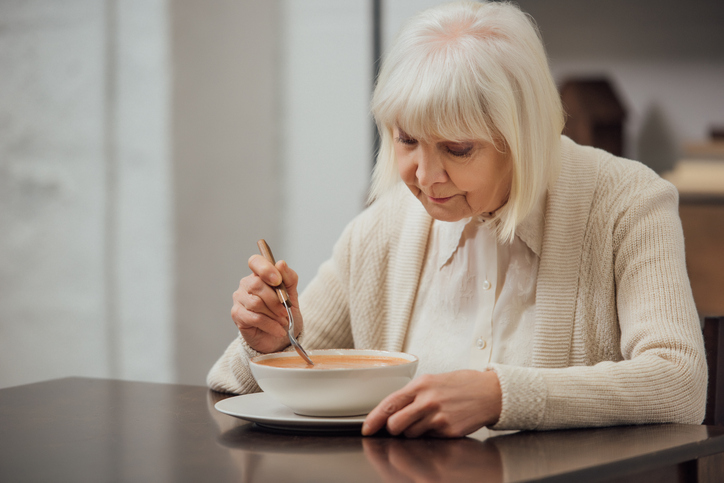
Appetite decline in seniors is common, but it is important to rule out health problems and then help older loved ones find joy in food again.
You’ve just made a large batch of Mom’s special chili recipe. Your house smells delectable, and you can’t wait to dig in. But while you are enjoying not merely the taste but the memories the meal invokes, Mom is simply stirring the food around in her bowl. And it’s not the first time. Lately her appetite has been decreasing, and it’s beginning to concern you.
What Can Cause an Appetite Decline in Seniors?
Appetite decline in seniors is very common, for a number of reasons, including:
- Feeling as though they’ve lost control over other aspects of life
- Loneliness and having no one to share meals with
- Depression and/or grief
- Dehydration
- Loss of taste or smell that makes food less appealing
- A routine that doesn’t include regular mealtimes
- Problems with chewing, swallowing, or self-feeding
- Difficulty with preparing meals
- A sedentary lifestyle
It is essential to first talk with the person’s doctor and dentist to eliminate any health issues or medication side effects that may be causing the problem. Once it’s determined that there is not a medical basis for the change in appetite, try these strategies to help improve the individual’s enjoyment in eating in order to maintain proper nutrition.
- Offer high-calorie foods in small portions. As opposed to three large meals per day, try smaller servings more frequently. You can still make larger batches of favorite dishes, splitting them up into individual servings that may be frozen and reheated. Other foods to try that will supply important nutrients include cheese, peanut butter or other nut butters, finely chopped eggs or meat, avocado, yogurt, diced fruit, and whole milk.
- Incorporate softer options. During the summer when fruit is particularly appetizing, try mixing up some healthy smoothies. Summer can also be a great time for ice cream, frozen yogurt, and milkshakes. Make it more festive and fun by inviting family members over to make their own unique treats and enjoying them outdoors together.
- Develop a schedule. As opposed to waiting until the person says they’re hungry, set designated times every day and stick to a schedule for eating. It may take some experimentation to figure out the best schedule, but give the new routine time to work before adjusting. Ensure that the person’s routine includes an adequate amount of physical activity and exercise as well, which helps to enhance appetite.
- Modify foods and utensils accordingly. If self-feeding is challenging, there are a number of adaptive utensils to explore. You can also make eating easier by serving food that is cut into small, bite-size portions, as well as finger foods like sandwiches, fish sticks, string cheese, chicken tenders, etc.
Absolute Companion Care is here to help older adults manage obstacles to eating healthy. We can prepare nutritious meals and snacks, supply inspiration to stay physically active, and provide friendly companionship during mealtime to make it more fulfilling. Reach out to us online or give us a call at 410-357-9640 for more information about our home care services in Monkton, Cockeysville, Hunt Valley and nearby communities and how we can help someone you know.
